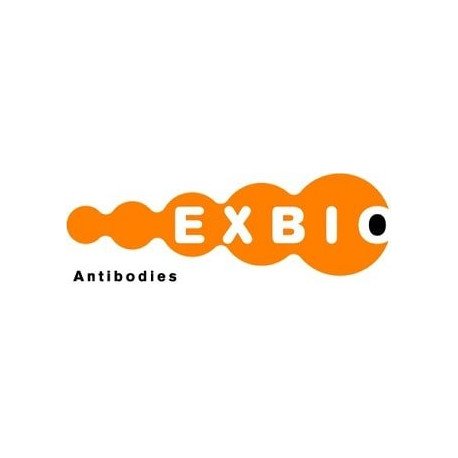Cart 0 Product Products (empty)
No products
To be determined Shipping
0,00 € Total
Prices are tax excluded
Product successfully added to your shopping cart
Quantity
Total
There are 0 items in your cart. There is 1 item in your cart.
Total products (tax excl.)
Total shipping (tax excl.) To be determined
Total (tax excl.)
Data sheet of Mouse Monoclonal to CD97
| Brand | Exbio |
| Product type | Primary antibodies |
| Reactivity | Human |
| Clonality | Monoclonal |
More info about Mouse Monoclonal to CD97
| Brand: | Exbio |
| Product no.: | 11-267-C025 |
| Product type: | Primary antibodies |
| Host species: | Mouse |
| Product name: | Mouse Monoclonal to CD97 |
| Antigen: | CD97 |
| Clonality: | Monoclonal |
| Clone: | MEM-180 |
| Isotype: | IgG1 |
| Immunogen: | PHA-activated peripheral blood cells |
| Format: | purified |
| Specificity: | The antibody MEM-180 recognizes a unique epitope on CD97, a 75-85 kDa surface glycoprotein of G-protein-coupled receptor family, expressed on activated B and T lymphocytes, monocytes/macrophages, dendritic cells and granulocytes. _x000D_ HLDA VI; WS Code BP 415 _x000D_ HLDA VI; WS Code NL N-L023 _x000D_ _x000D_ _x000D_ |
| Categories: | CD and Related Antigens (Human) |
| Concentration: | 1 mg/ml |
| Storage buffer: | Phosphate buffered saline (PBS) with 15 mM sodium azide, approx. pH 7.4 |
| Storage / stability: | Store at 2-8°C. Do not freeze. Do not use after expiration date stamped on vial label. |
| Background: | CD97 is a G-protein-coupled seven-span transmembrane adhesive receptor that is constitutively expressed on granulocytes and monocytes and rapidly upregulated on T and B cells upon activation. CD97 is produced in alternatively spliced forms and its cellular ligand is CD55 (DAF), which protects various cell types from complement-mediated damage. Interaction of CD97 on leukocytes and CD55 on vessel cells probably facilitate leukocyte activation and migration into the tissues, similarly, CD97 seems to play a role in tumour migration and invasiveness. CD97 is involved in T cell regulation and peripheral granulocyte homeostasis. |
| Purity: | > 95% (by SDS-PAGE) |
| Purification: | Purified by protein-A affinity chromatography |
| Product specific references: | *Wobus M, Vogel B, Schmücking E, Hamann J, Aust G: N-glycosylation of CD97 within the EGF domains is crucial for epitope accessibility in normal and malignant cells as well as CD55 ligand binding. Int J Cancer. 2004 Dec 10;112(5):815-22., *Leukocyte Typing VI., Kishimoto T. et al. (Eds.), Garland Publishing Inc. (1997). |
| General references: | *Wang T, Tian L, Haino M, Gao JL, Lake R, Ward Y, Wang H, Siebenlist U, Murphy PM, Kelly K: Improved antibacterial host defense and altered peripheral granulocyte homeostasis in mice lacking the adhesion class G protein receptor CD97. Infect Immun. 2007 Mar;75(3):1144-53._x000D_ _x000D_ , *Abbott RJ, Spendlove I, Roversi P, Fitzgibbon H, Knott V, Teriete P, McDonnell JM, Handford PA, Lea SM: Structural and functional characterization of a novel T cell receptor co-regulatory protein complex, CD97-CD55. J Biol Chem. 2007 Jul 27;282(30):22023-32._x000D_ _x000D_ , *Galle J, Sittig D, Hanisch I, Wobus M, Wandel E, Loeffler M, Aust G: Individual cell-based models of tumor-environment interactions: Multiple effects of CD97 on tumor invasion. Am J Pathol. 2006 Nov;169(5):1802-11._x000D_ _x000D_ _x000D_ , *Visser L, de Vos AF, Hamann J, Melief MJ, van Meurs M, van Lier RA, Laman JD, Hintzen RQ. Expression of the EGF-TM7 receptor CD97 and its ligand CD55 (DAF) in multiple sclerosis. J Neuroimmunol. 2002 Nov;132(1-2):156-63._x000D_ _x000D_ _x000D_ |
| Related products: | - Mouse Monoclonal to CD99R - Mouse Monoclonal to CD98 - Mouse Monoclonal to CD99 |
| Shipping condition: | Room temperature |


